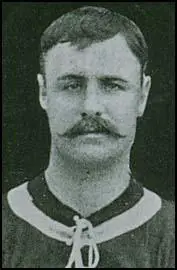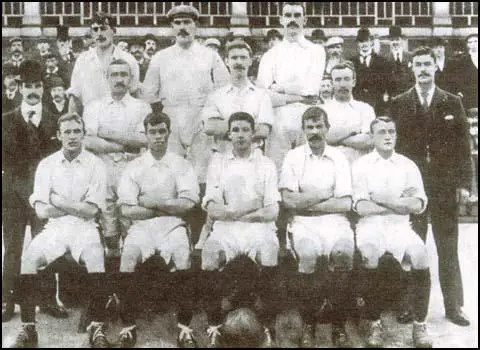The History of West Ham United
1900-1901
In 1900 Arnold Hills decided to expand his business interests by acquiring the engineering firm of John Penn & sons. In order to raise new capital to finance the takeover, he decided to make Thames Iron Works a public company. This meant that in future he would be accountable to shareholders. Hills was no longer in a position where he would be allowed to pump company money into the football club.
On 7th March, 1900, the West Ham Guardian reported that: "It is announced that the committee of Thames Ironworks FC are to consider some sort reorganization. A proposal is evidently on the table. For one who has it on authority says it will 'if adopted, undoubtedly be to the club's advantage'. This is good news. Supporters are tired of seeing the club so low down as fourth from the bottom".
A few weeks later the West Ham Guardian reported that the football would be sold. "With regard to next season however, a meeting will be called, and the Mayor of West Ham will be asked to preside, at which gathering the locals will be asked to take up 500 £1 shares. If this amount be raised Mr A. F. Hills will add to it another £500, and, in addition, grant the use of the Memorial Grounds. Another condition is that all members of the team must be teetotallers. It is probable too, that the name of the club will be changed to Canning Town." The newspaper was wrong about this and the new club was called West Ham United. The idea that all players should be teetotallers was also dropped.
It was hoped that over 2,000 supporters would buy shares in the new club. The West Ham Guardian urged local people to buy shares: "There is little question that the present question of managing small teams is not the right one. For so many clubs get into debt and finally are snuffed out... A shareholder will have everything to gain, by attending the matches, and inducing others to come with him, therefore it seems to me that the nail has been hit right on the head, and the problem of the football world of management is about to be solved."
Hills announced that anyone who purchased just ten shares would be allowed to join the Board of Directors of the club. Despite this offer, a large number of shares remained unsold and the the finances of the new club remained in a poor state. had trouble selling these shares to supporters.
In September, 1900, The Morning Leader reported: "The prospectus of the new limited liability company, to be known under the title of the West Ham Football Club Company Limited is at hand. The primary object will be to encourage and promote the game of football in West Ham and district, and powers have also been taken by the company authorising them at any time to acquire land and other property."
It was also announced that: "The directors propose to make the following charges, to shareholders only, for season-tickets for the football season 1900/01: admission to ground and open stand, 7s 6d, admission to ground, enclosure and grand stand 10s 6d and 12s 6d respectively.... Mr. A. F. Hills who will most likely to take up £500 worth of shares, is very keen on playing a teetotal eleven next season, and the experiment is worth trying if only to vindicate the rights of football employers to call their own tune after paying the piper."
The capital of West Ham United was £2,000 (4,000 shares at 10s each). Arnold Hills purchased 1,000 shares and remained the major influence at the club. However, he was unable to enforce the idea that all players should be teetotallers.

Lew Bowen, a clerk at the Thames Iron Works & Shipbuilding Company, became the new club secretary. The club made several new signings including: Hugh Monteith (Bristol City), Fergus Hunt (Arsenal), Freddie Fenton (Gainsborough), George Radcliffe (Grimsby Town), James Reid (Port Vale), Albert Kaye (Chatham) and Billy Grassam (Port Vale).
These new players joined established players in the team such as Charlie Dove, Roderick McEachrane, Fred Corbett, Charles Craig and Syd King. Walter Tranter returned from a spell with Chatham, but the club did lose the services of top scorers, Bill Joyce, Albert Carnelly and Ken McKay.
The season started well with a 7-0 victory over Gravesend (Grassam 4, Reid 2, Hunt). West Ham could not maintain that momentum and lost 7 of its next 13 games. That included a game at Millwall that attracted a crowd of 10,000. The best attendance that season at the Memorial Grounds was the game against Tottenham Hotspur. Unfortunately for the home supporters, they saw West Ham defeated 4-1.
Queen Victoria died in January, 1901. The Football Association called for a stoppage to all soccer on the Saturday following the death of the monarch. The Southern League objected to this directive on the grounds that this was an infringement of a professional footballers' right to earn a living. West Ham's game with Watford on the 26th January was one of only four Southern League fixtures that went ahead. West Ham won the game with Billy Grassam scoring the only goal of the game.
Results improved after Christmas and by the end of the season West Ham was in sixth place behind Southampton, Bristol City, Portsmouth, Millwall and Tottenham Hotspur. West Ham's goals were scored by Billy Grassam (15), Fred Corbett (9), James Reid (5), Albert Kaye (5), George Radcliffe (4) and Fergus Hunt (4).
West Ham had a good run in the FA Cup and over 12,000 saw them draw 1-1 with Clapton Orient. West Ham won the 5th round replay 3-2 with Billy Grassam scoring a hat-trick. The next round saw the visit of mighty Liverpool. Watched by a home crowd of 6,000, Liverpool won 1-0.

